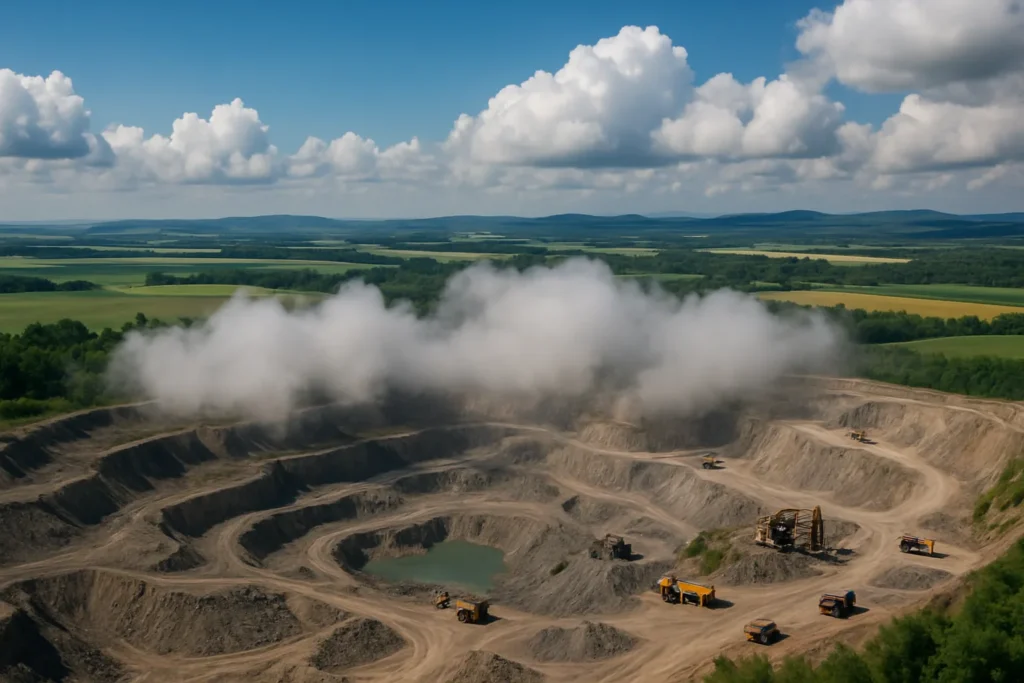Strategic Resources at a Crossroads: Ukraine’s Bold Gamble
Imagine a nation battered by war, standing atop an untapped treasure trove while its economy bleeds. As Ukraine reels from the devastation wrought by Russia’s assault, its government has chosen a new battleground: the earth beneath its feet. Prime Minister Yuliia Svyrydenko’s sweeping order to audit all license holders of the country’s strategic mineral deposits marks a pivotal moment—with potential to reshape both Ukraine’s fortunes and its global alliances.
Ukraine, the linchpin between East and West, holds nearly 3,000 mining licenses, yet about 10% lie dormant—valuable assets left idle by speculators, oligarchs, or foreign entities. Now, an audit led by the Economy, Environment and Agriculture Ministry and the State Service of Geology and Mineral Resources aims to separate genuine development from profiteering. In the words of President Volodymyr Zelenskyy, this sweeping review will demand “serious legal work” from agencies previously sidelined in challenging entrenched interests.
This isn’t just about counting rocks in the ground. It’s a hard reset. A mid-July 2025 Cabinet decree identified 28 minerals and plots—including aluminum, uranium, copper, and beryllium—as strategically vital. These aren’t raw materials of the past; they’re the supply chain lifeblood for defense tech, electric vehicles, semiconductors, and green energy—sectors powering the world’s next industrial leap.
From Dormant Licenses to Dynamic Recovery: The Audit’s Stakes
An audit of this scale—encompassing each subsoil user, from the smallest operator to publicly traded extraction giants—reflects a growing international acknowledgment: control over critical minerals is fast becoming an arena of geopolitical rivalry. China’s dominance in rare earths is a cautionary tale Ukraine is keen to avoid repeating.
On the diplomatic front, this process is deeply entwined with the newly inked Subsoil Agreement between Kyiv and Washington. Ukraine’s government has committed to relaunching tenders for hydrocarbons in the Mezhyhirska and Svichanska fields. These steps ensure that foreign partners, principally the United States, secure a front-row seat to Ukraine’s mineral wealth—but not without strings attached.
Beyond that, the agreement stipulates that half of all revenues from mineral extraction go to a U.S.-Ukraine joint investment fund. American investors, on the surface, gain privileged access, but so does Ukraine—a war-ravaged country now starved for outside capital and technological know-how. The hope is that stricter oversight and an open, transparent process will foster real development and undercut the shadowy networks that have historically siphoned profits with impunity.
“Transparency and partnership aren’t just catchwords—this audit and U.S. deal may well determine whether Ukraine’s mineral riches revive the nation or remain one more plundered promise.”
What lessons does history teach in moments like these? Consider Bolivia’s lithium saga or Congo’s copper mines: resource-rich countries rarely prosper unless their governments pair investment with real regulatory teeth. Ukraine’s challenge is to avoid becoming another casualty of the so-called resource curse. Tackling dormant licenses—those held idle for speculation rather than extraction—signals an intent to reclaim agency over its national assets.
Transparency Promised, But Old Ghosts Haunt the Present
“Ukraine has become one of the key players in the global critical minerals market almost overnight,” says Dr. Katherine Younger, a Ukraine specialist at the Vienna Institute for Human Sciences. She warns that the temptation for quick deals and backroom arrangements looms large, as Ukraine races to rebuild. The audit’s credibility will hinge on whether the government really wrests control from politically connected insiders.
Authentic reform is desperately needed. For years, Ukraine’s subsoil—and the licenses covering it—have been prime targets for corruption and oligarchic capture. Even the names Mezhyhirska and Svichanska evoke suspicion, having long been associated with murky privatizations and outsized benefits for well-placed players. The new audit, then, must be more than a bureaucratic shuffle; it must bring clear consequences for nonproductive license holders and reward those committed to responsible development.
Yet the devil, as always, hides in the details. Who adjudicates the fate of a dormant license? What standards of activity or investment qualify? Ukrainian civil society groups, such as Transparency International Ukraine, are already calling for full public disclosure—insisting that only open data will restore trust in a system historically shrouded in secrecy.
International backers aren’t shy about their expectations, either. The State Department’s 2023 Infrastructure and Mineral Security Report highlighted Ukraine’s “unique window” but cautioned that “investment without transparency is a recipe for disillusionment and renewed unrest.” Many experts urge vigilance over how these new American-Ukrainian partnerships will be structured and governed—lest foreign influence simply replace or reinforce existing oligarchic interests.
Rebuilding with Purpose: Ukraine’s Progressive Path Forward?
Is it possible for wartime Ukraine to chart a new model—one characterized by equity, legal predictability, and genuine international cooperation? Leading progressive economists argue that it’s not only possible, but essential. Harvard’s Dr. Daria Kaleniuk, herself a former anti-corruption activist, points out: “If we treat natural resources as a public good, Ukraine’s recovery can become a showcase for postwar economic justice and sustainable development.” The government’s bold audit, if managed openly, could reclaim lost revenues to fund schools, hospitals, and energy infrastructure, not just foreign investor dividends.
Getting there won’t be easy. The pressure from conservative voices—both domestic and overseas—to expedite extraction, privatize oversight, or soften regulatory standards must be resisted in the name of long-term fairness. The success or failure of this audit, and the associated U.S. mineral deal, will be a barometer of Ukraine’s true postwar renewal.
Ukraine’s mineral riches are a test not only of national will but of global priorities. Will investment be paired with real transparency and social responsibility? Or will the country’s natural bounty become the latest commodity bartered behind closed doors, its benefits accruing only to the few?
The world is watching. For Ukraine—and for advocates of justice, reform, and sustainable prosperity everywhere—the stakes could hardly be higher.

